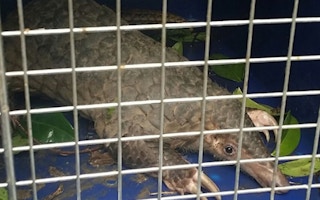A lack of understanding of the health issues of wild animal populations is leaving humanity exposed to even more severe pandemics than the ongoing Covid-19 outbreak, experts from the Zoological Society of London (ZSL) have warned.
To continue reading, subscribe to Eco‑Business.
There's something for everyone. We offer a range of subscription plans.
- Access our stories and receive our Insights Weekly newsletter with the free EB Member plan.
- Unlock unlimited access to our content and archive with EB Circle.
- Publish your content with EB Premium.
ZSL, a conservation charity which specialises in the science behind zoonotic diseases—those that transfer from wildlife to humans—said that more research is needed to better understand diseases in wildlife populations, and the routes to these becoming human diseases, to reduce the risk of future pandemics.
Covid-19 is believed to have originated from a wildlife market in Wuhan, in the Chinese province of Hubei, before spreading around the world, infecting more than 160,000 people worldwide and killing nearly 6,000 at the time of publication.
The biggest public health threats in recent memory, including Covid-19, Severe Acute Respiratory Syndrome (Sars), Ebola and Zika, began as diseases in animals that jumped to people.
ZSL noted that 61 per cent of all human pathogens originate from animals, and two-thirds of all human diseases discovered since the beginning of this century have come via this route.
“
No one knows how many infections circulate in wildlife populations or under what circumstances they could create the next human pandemic.
Dominic Jermey, director general, Zoological Society of London
“No one knows how many infections circulate in wildlife populations or under what circumstances they could create the next human pandemic,” said Dominic Jermey, director general of ZSL, in a statement.
“But if we know the risk factors for zoonotic virus spill-over, we can put in place safety measures to stop it happening in the first place without adversely affecting wild animals in which the viruses occur naturally,” he said.
The growth of the legal and illegal wildlife trade—which is estimated to be worth between US$7 billion and US$23 billion a year—and increasing contact with wild animals as humans encroach further into wild habitats, increases the risk of animal-to-human disease transfer, ZSL said.
ZSL is calling for the United Kingdom, which has lost 35 people to the coronavirus so far, with an expected 8 million Britons facing hospitalisation in a worst-case scenario, to set up a dedicated centre of excellence to better understand the reservoirs of diseases in wildlife, and the potential routes of transmission to humans, to help protect against future pandemics.
However, the global hub for the illegal wildlife trade is in Asia, and Rohit Singh, zero poaching lead for the World Wide Fund for Nature (WWF), told Eco-Business that the trade should be strictly prohibited. But enforcement of laws in many illegal wildlife markets in the region is “weak or non-existent”.
Wildlife markets, which are prevalent across Southeast and East Asia, provide a potentially fertile environment for viral mutations and human infections, said Singh.
“Movements of infected people, aided by rapidly growing transportation and tourism sectors, can then turn local outbreaks into pandemics,” he said.
Climate change, deforestation, encroachment into protected wild areas, unsustainable or unregulated consumption of wild meat and the illegal wildlife trade all contribute to the spread of pandemics, he said.
China banned the buying, selling, and eating of wildlife in February in response to the Covid-19 outbreak.





















